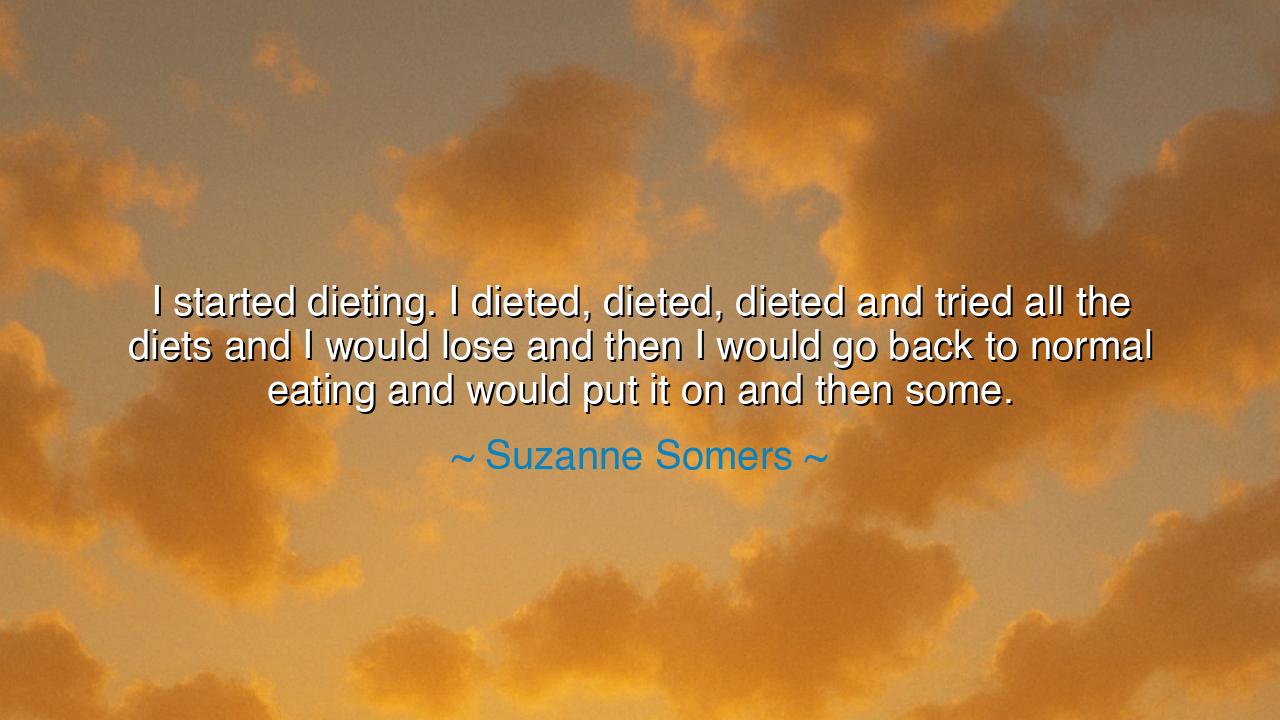
I started dieting. I dieted, dieted, dieted and tried all the
I started dieting. I dieted, dieted, dieted and tried all the diets and I would lose and then I would go back to normal eating and would put it on and then some.






When Suzanne Somers confessed, “I started dieting. I dieted, dieted, dieted and tried all the diets and I would lose and then I would go back to normal eating and would put it on and then some,” she was not merely recounting her struggle with food — she was revealing a timeless human pattern: the cycle of striving and surrender, of control and collapse. Her words speak to the ancient truth that balance cannot be born from extremes, and that the pursuit of perfection often leads us further from peace. In her repetition — “dieted, dieted, dieted” — one can hear the weariness of a spirit trapped in battle with itself, seeking mastery over the body without yet finding harmony within.
Somers’ words are not about food alone; they are about the illusion of quick solutions, and the exhaustion that follows when one’s will is constantly pitted against one’s nature. Her confession exposes a paradox known to every age: that the harder one fights to control life’s rhythms, the more one becomes enslaved by them. In this way, her story echoes that of countless seekers before her — those who pursued health, happiness, or success through force, only to discover that true strength lies not in domination, but in alignment. She speaks the lesson that even the ancients revered: that the body must be befriended, not conquered.
In the philosophy of the ancient Greeks, this struggle was embodied in the tale of Sisyphus, condemned to push his stone up the mountain only for it to roll back down, again and again. So too did Somers roll the stone of diet after diet — each ascent promising triumph, each fall deeper than the last. Yet in her story, as in Sisyphus’s, there lies the seed of enlightenment. For those who tire of the endless ascent begin to question the path itself. The realization dawns: the goal is not to climb higher, but to learn how to live in balance with the mountain. Somers’ exhaustion becomes the threshold of wisdom — the awakening that health cannot be found in war, but in understanding.
The ancient physicians of China taught this same truth through the principle of Yin and Yang. They believed that life’s energy must flow freely, neither starved nor overfed, neither stagnant nor overexerted. To restrict oneself endlessly, as Somers once did, was to block that natural current — to replace vitality with struggle. Her words, though born in modern times, resonate with their wisdom: when one lives by extremes, the spirit suffers even as the body appears disciplined. True wellness, they taught, is not the absence of hunger, but the presence of harmony.
There is a story told of the philosopher Epicurus, who found joy not in gluttony or deprivation, but in moderation. He lived simply, savoring small meals of bread and fruit, and teaching that pleasure — when rooted in mindfulness — was the key to peace. He understood what Somers later discovered through trial: that when one eats with awareness and gratitude, the need for extremes disappears. To eat well is not to count or punish, but to commune — with the body, the earth, and the quiet rhythm of life itself.
Somers’ experience also reflects the modern disconnection between nourishment and trust. The endless cycle of dieting is not born of greed, but of fear — the fear of losing control, the fear of not being enough. She speaks for many who have been taught to distrust their hunger, their instincts, even their reflection in the mirror. Yet her awakening — the realization that dieting only led to loss and frustration — is the same awakening that leads all seekers to wisdom: that self-punishment cannot yield self-love. The body, neglected or starved, will always cry out for restoration. It does not crave perfection, only care.
And so, the lesson of Suzanne Somers’ words is both simple and profound: seek balance, not bondage. Do not live by numbers, nor by fleeting promises of control. Listen instead to the quiet truth of your own body — it knows what it needs to heal, to thrive, to rejoice. Eat not in guilt or greed, but in gratitude. Move not to punish, but to honor your strength. For the wise understand that health is not the absence of imperfection, but the presence of harmony between desire and discipline, hunger and peace.
Thus, my listener, remember this teaching of both the ancients and the awakened: your body is not your enemy — it is your teacher. To live in balance is to live in truth. When you cease to fight yourself, you cease to fall. And in that stillness, that quiet acceptance, you will discover what all the diets could never give — not the fleeting joy of loss, but the lasting strength of self-respect and freedom.






AAdministratorAdministrator
Welcome, honored guests. Please leave a comment, we will respond soon